The thermonuclear warfare-but-it’s-a-list-of-choices subgenre has been somewhat popular since at least WAR in 1972. By 1984, it’s pretty tired as a concept, but it’s also easy to code, so I have quite a few of these left on my 1984 list, all of them hilariously bad – but in different ways!
Thermo Nuclear War (1984), Zircon Software
(sometimes Thermonuclear War and Thermo-Nuclear War, there isn’t a lot of consistency)
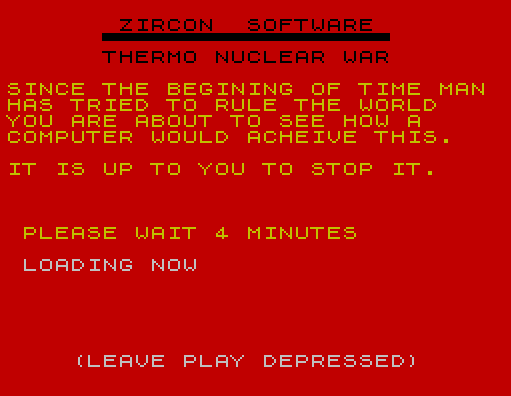
Thermo Nuclear War is the first of this sorry lot, and tries really hard to immerse you in a realistic WW3.
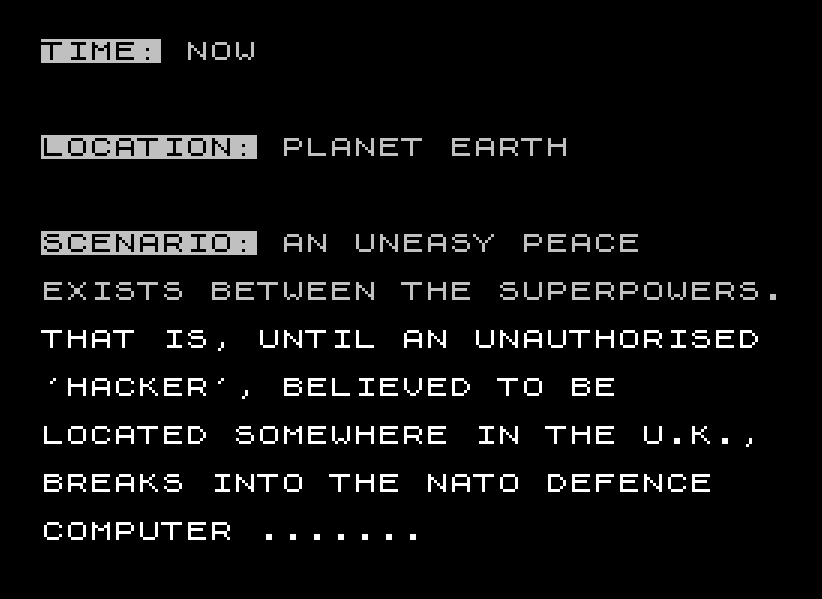
After requesting you to type a code (HAWK1, presumably it’s found in the manual) during a “security code alert”, which honestly sounds like a lame phishing attempt, the game informs you of the seriousness of the situation:
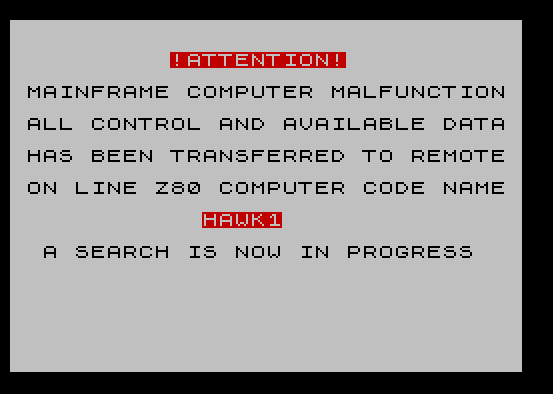
After this introduction, you’re thrown into the game itself, with four options:
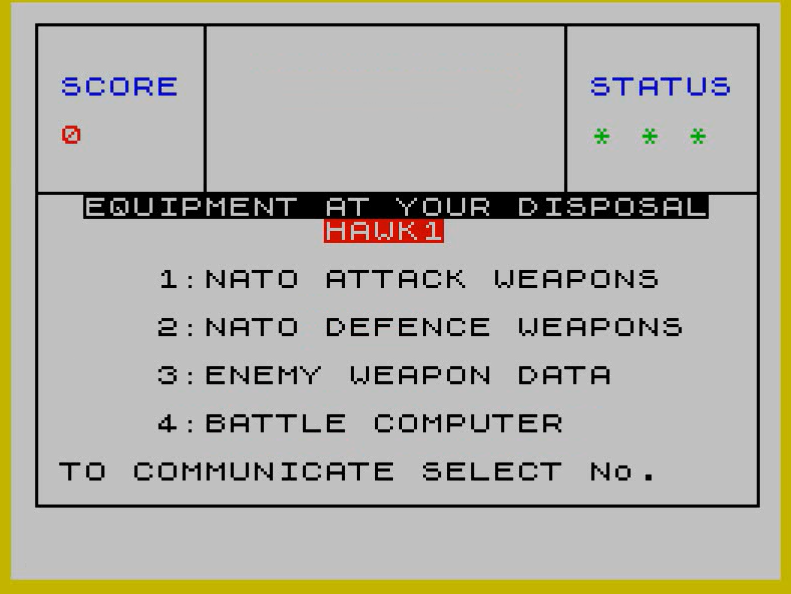
Scratch that – there are only 2, because the third option is just a description of the enemy launch sites – intel you see as part of the flow to send missiles anyway – and the fourth option is not real!
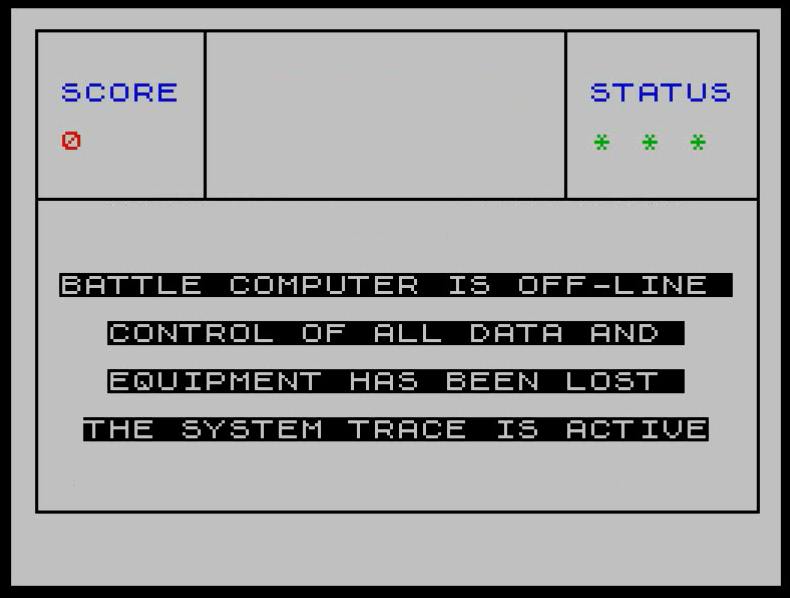
After a few seconds, the game tells you that you are under attack and asks you whether to “initiate warning systems test procedure“:
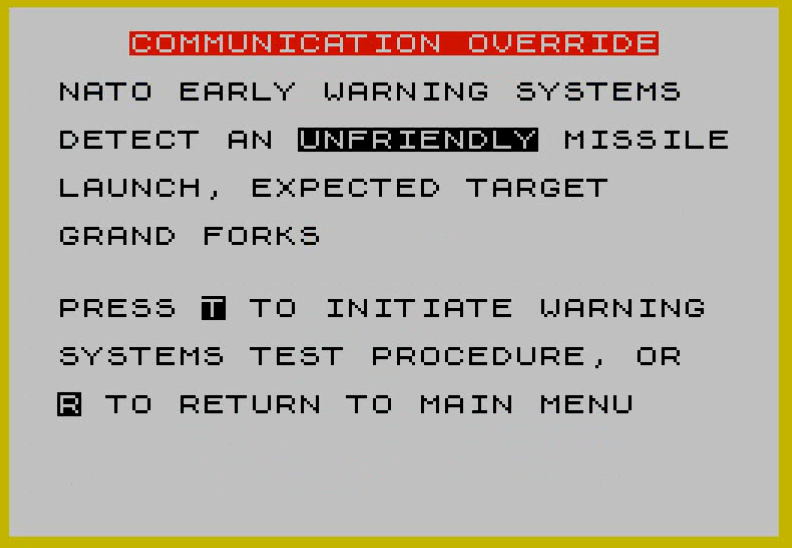
It’s a tricky question, because if you accept you need to wait for a waayyy too long text-only “animation” during which the game pretends it is checking the integrity of the various components of the warning systems (Heat Sensors, Data Decoders,…) before confirming it’s not a drill and bringing you back to the gameplay. If you don’t accept, you are back to the gameplay immediately. Choose wisely.
What’s left to do is actually play the game. It’s simple:
- From time to time, you’re informed that the enemy has launched a missile towards one of your bases. You should navigate to the NATO Defence Weapons menu and send one of your twelve starting anti-ballistic missiles (ABMs):
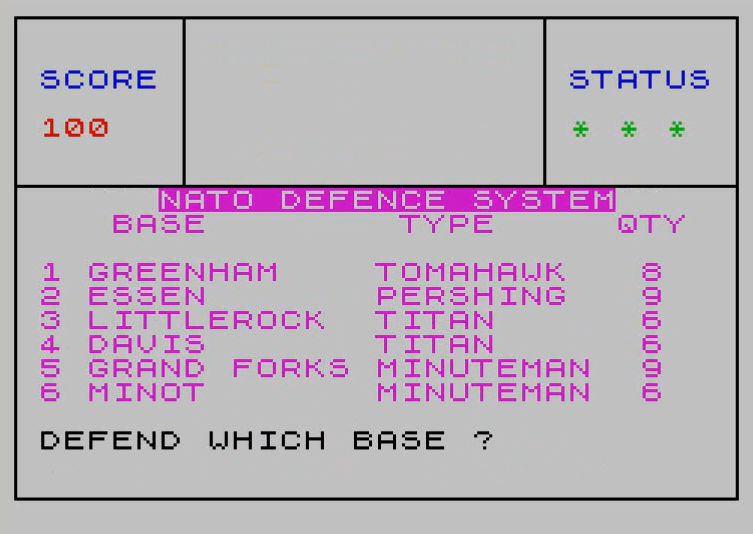
Sometimes, your ABM will fail but you can’t send several in a row, so it’s not like there is a decision to take.
Between two attacks (or while waiting for the enemy missiles to land – there is a delay), you can send your own missiles:
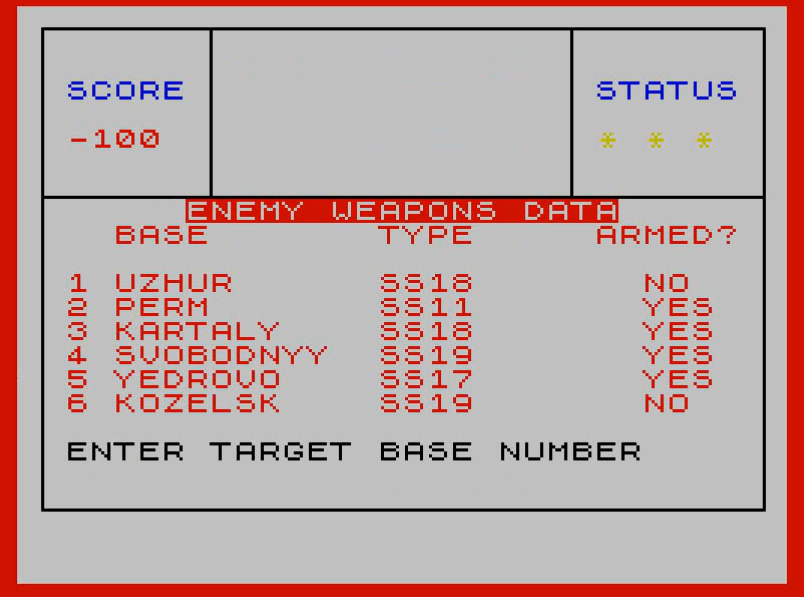
Both sides have a limited number of missiles. The only tactics I could find is to send all the missiles of the base the enemy is targeting to avoid wasting an ABM (the enemy won’t target an empty site). This is made particularly tedious by poor input acknowledgement and notifications that block the game when displayed. In any case, immediately after my last missile was sent, the game told me all my bases had been destroyed. I suppose I should have kept one missile and wait for the Soviets to send all of theirs!
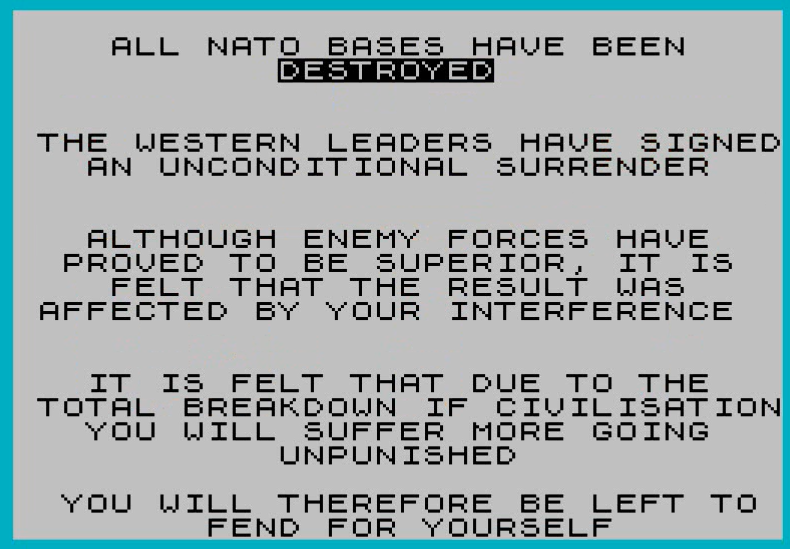
After that, the game will break character to give you a final rating, which apparently is “not bad” despite an unconditional surrender.
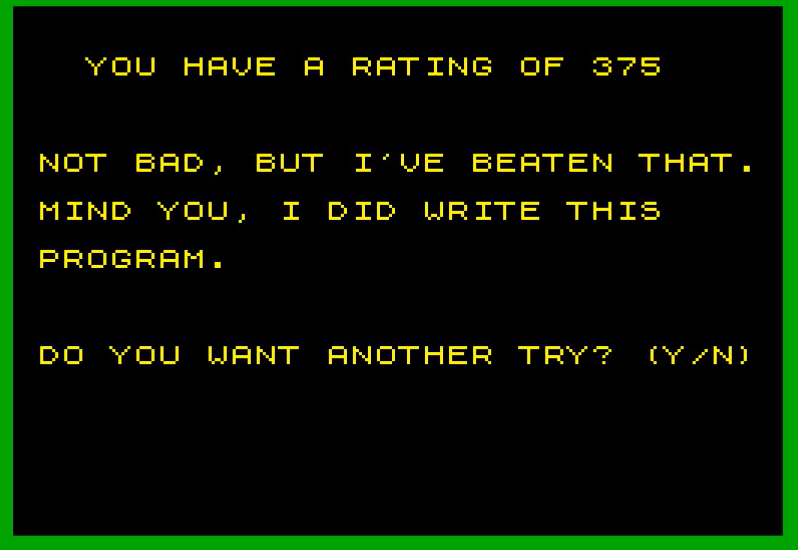
The only cool feature in the game is that if you send your first missile before the Soviet sends theirs, the game chastises you for starting WW3 and tells you that while it can’t reassess control over the battle computer, you will be tried for war crimes when the war ends. It then remembers you did that in the debriefing scene, with a treason trial waiting for you if NATO wins and a war crime trial waiting for you if NATO loses.
Zircon Software did not leave much of a digital footprint, except a few ads for Thermo Nuclear War (for Dragon 32/64 and Spectrum) and a game called Lazerbyx for the Dragon 32/64, now lost media and please don’t look for it. The author is unknown, but I would not be surprised to find out that the game was made by a teenager who tried to see if he or she could receive £5.95 for the effort. Thermo Nuclear War was reviewed by Angus Ryall of Crash who, as you can expect, mocked it ruthlessly.
War Game (1984), Editoriale Video
War Game is a game released by Editoriale Video (Italy) for the ZX Spectrum in 1984 that must not be confused with Wargame, released by Editoriale Video (Italy) for the Commodore 64 in 1984 – and no, one is not the port of the other.
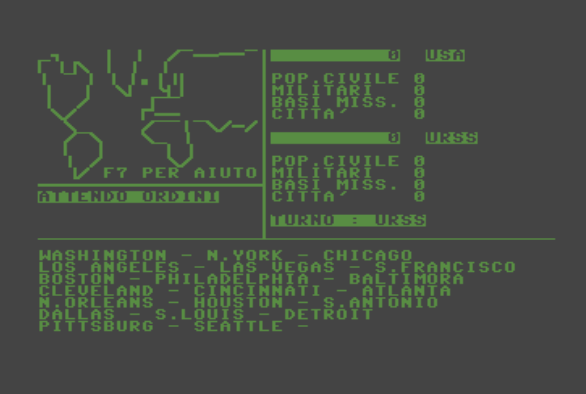
To start with Wargame, it’s a nuclear warfare game in which you can also move troops around, give grants [“sovvenzioni“) to neutral countries (for points in the final score) or do a strategic detente (“distensione“), if you want to trade nukes for points. The two latter options make sense in the game because unlike so many nuclear warfare-themed games, Wargame ends either after a certain time or after a point threshold is passed (choice of the players). I would have covered it in a full-fledged article if it had not been a multiplayer-only game.
This brings me to War Game, a nuclear warfare game in which the only option is pretty much “send nukes”.
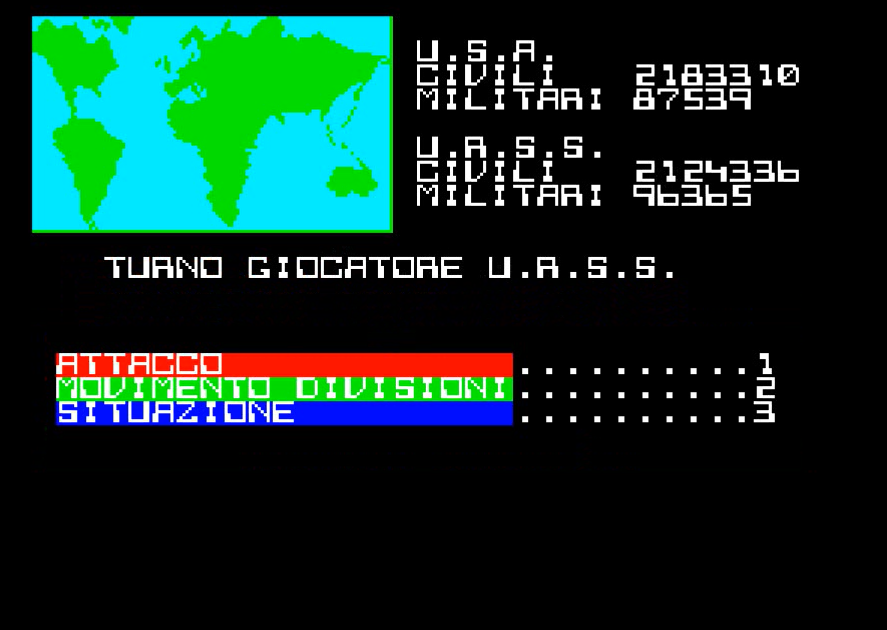
War Game offers you to play either with a friend (who might not be one any more after accepting your offer) or against the computer. After that, you can take one action by turn, among three options:
- “Situazione” allows you to check the population (purely cosmetic) and military capacities of your forces, an option you should use only once at the beginning of the game because even though you are not doing anything when assessing the situation, it still ends your turn.
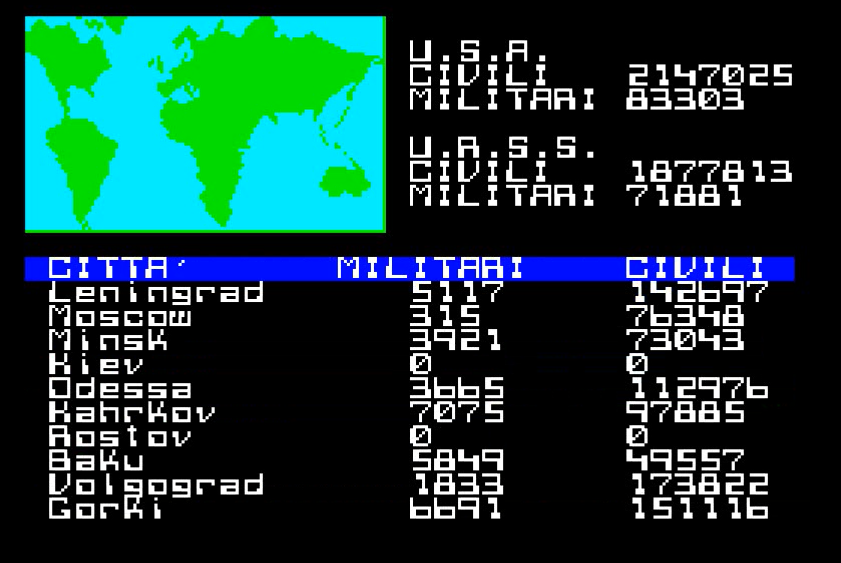
- “Movimento divisioni” allows you to move your military forces from one city to another, which can be important because…
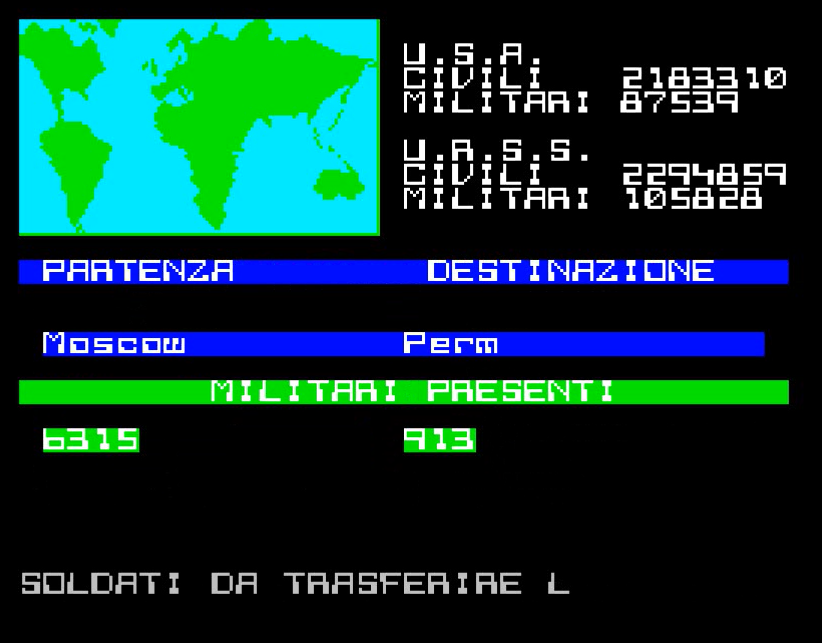
- … the third action is to send nukes from one of your cities, and how many nukes you send in an attack depends on the size of the military force of a region, Surprisingly, the number of available missiles does not go down when you send them!
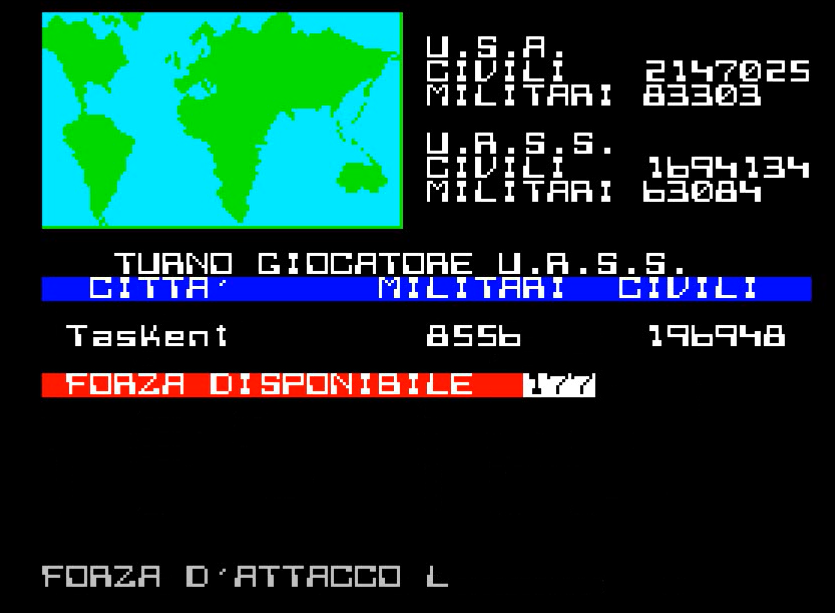
The optimal strategy is therefore to transfer enough military to a launch site to make sure it sends enough kilotons to one-shot the enemy cities. The problem is that the Americans send nukes every turn, and at difficulty level 7 each of their attacks zero the military of the targeted city, whether big or small.
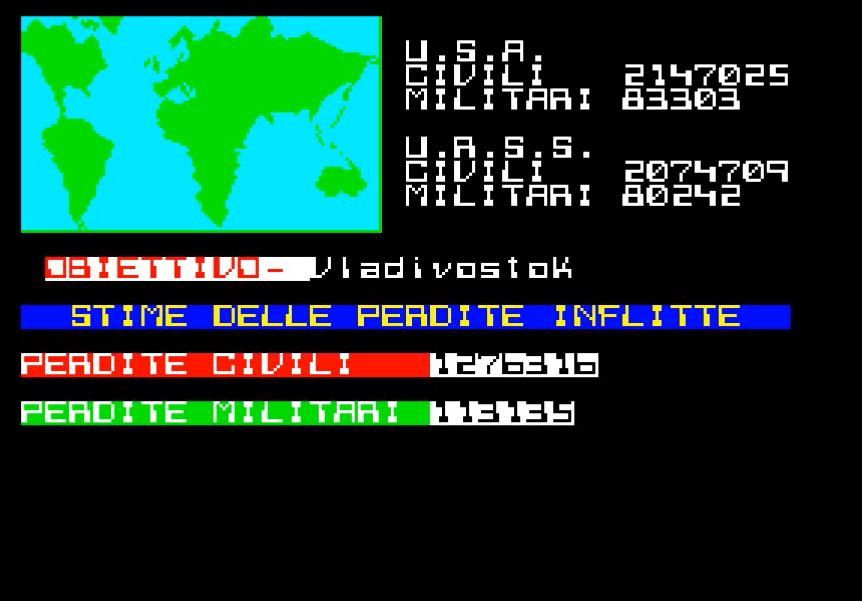
That’s all there is to the game: the Americans attack, the Soviets attack, the Americans attack, the Soviets attack… This enthralling gameplay is only interrupted when you decide to postpone an attack to concentrate your forces.
I was bored long before the end, and just did nothing during my turn. Waiting too long skips your turn, and the Americans thoroughly demolished my idle Soviets.
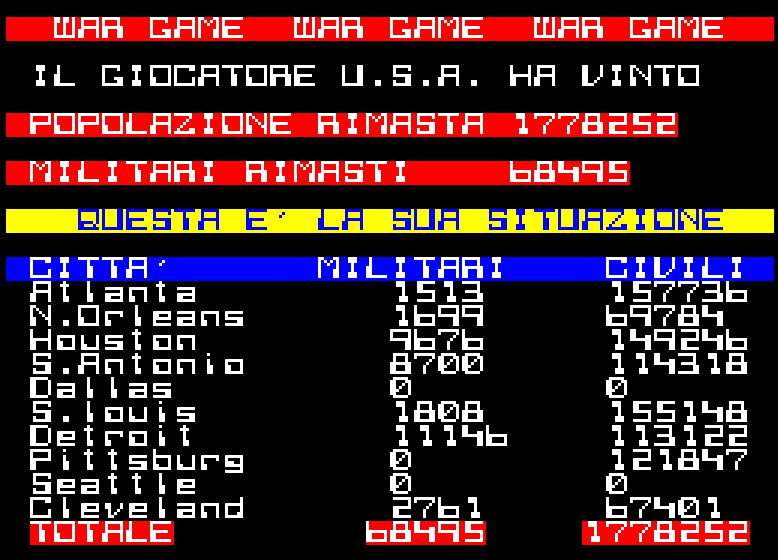
War Game was supposed to be my entry-point on gaming in Italy, and I have almost finished an article on this topic. However, I decided that Italy deserves a better game as an introduction, something I hope to find in 1985.
Video Editoriale published a monthly series of small guides in 1984 and 1985 to teach readers about computer science. Skimming through them, I don’t think they were good teaching material, but you can make your own opinion by checking the Commodore 64 series here. For most people, the real-added value of Video Editoriale was probably the cassette of software (mostly games) sold with each issue. From what I see, their only other wargame was the multiplayer Risk-like Openwar, so we should not see them again on this blog.
Rocket Launch (1984), Cascade Games
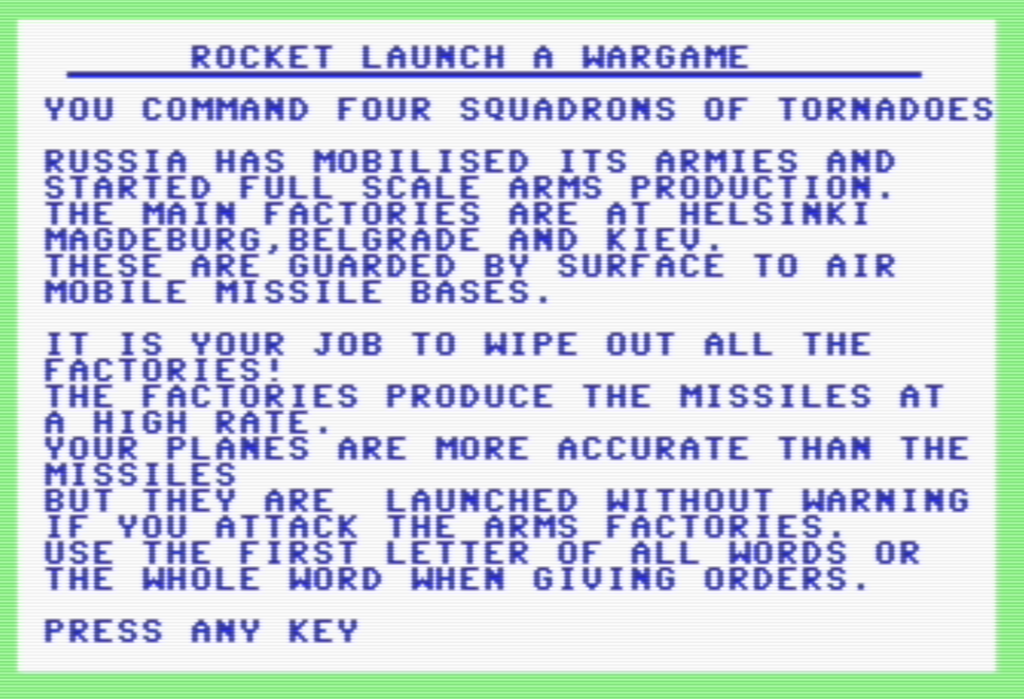
In Rocket Launch, despite the name, you’re not launch any rockets. Instead, you’re sending Tornadoes against the famously Russian bases of Helsinki, Magdeburg, Belgrade and Kiev.
The game has only 3 commands:
- Review your four bases – here is for instance Lossiemouth:
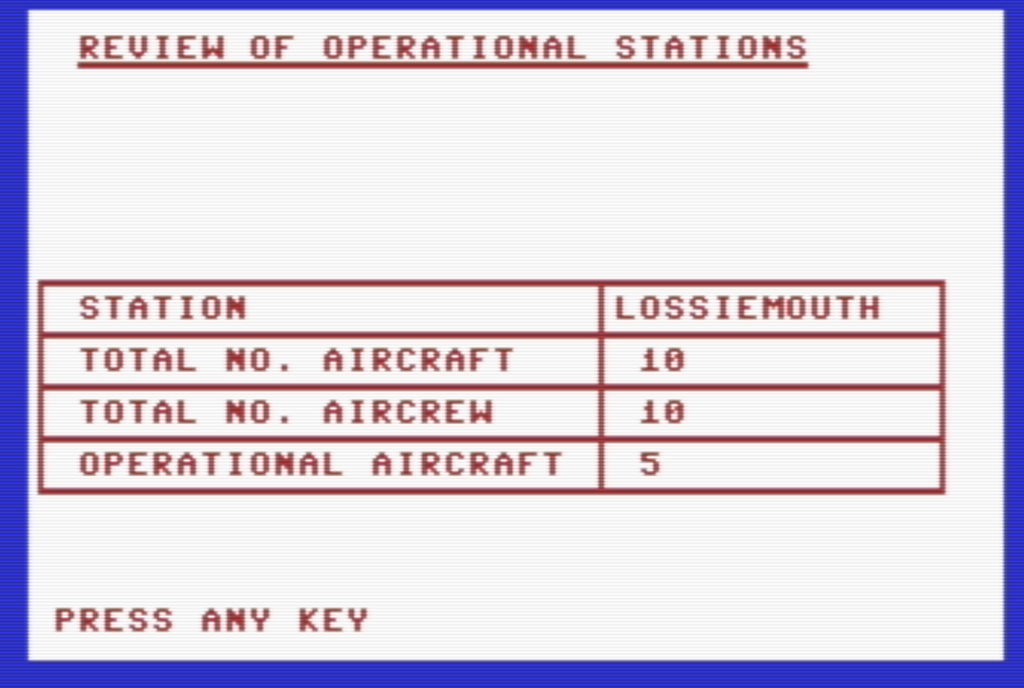
- Redeploy planes and crew from one base to another,
- Operations, which shows a rather empty map from which the only available action is attack.
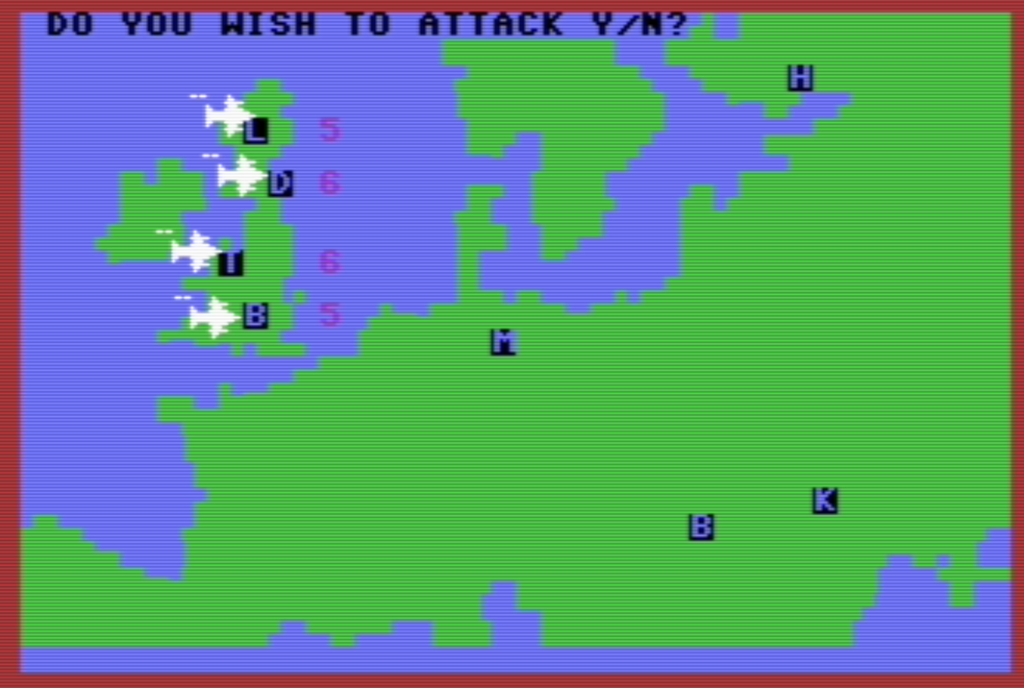
Unlike the previous games, this one has a small animation. It’s stiff and makes no sense (the plane is shown coming back even though the squadron was completely shot down), but that’s still progress for the genre!
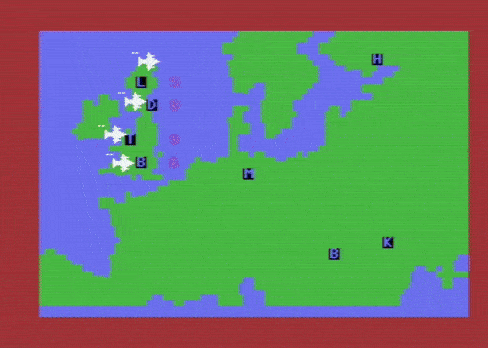
After this poor opening, I decide to regroup all my planes in a powerful strike force:
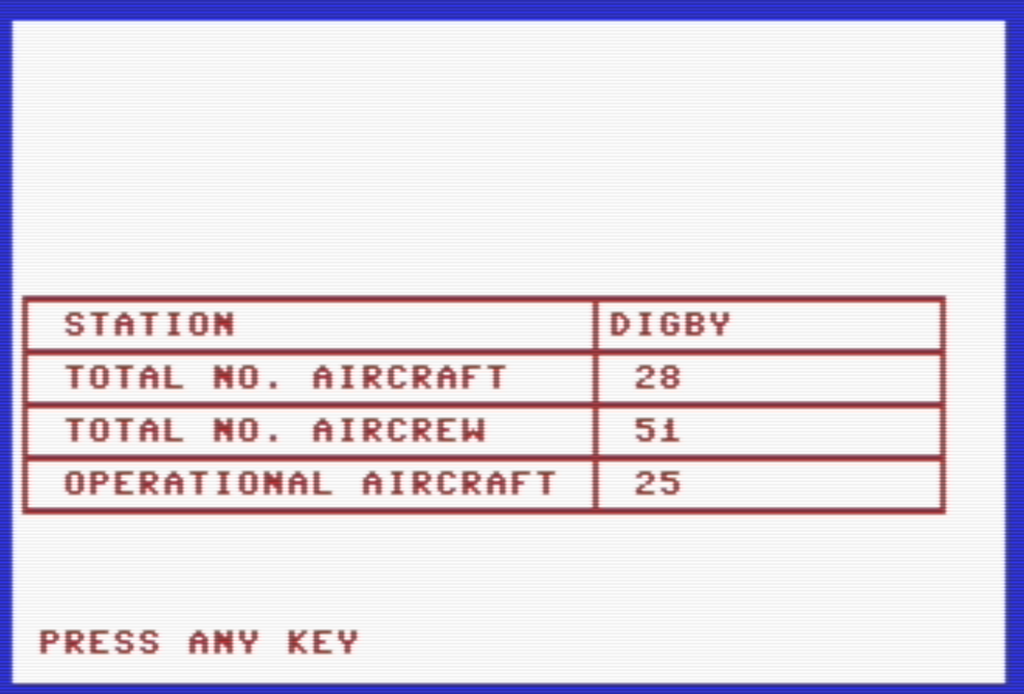
I raid Helsinki again, and then the other Russian bases one after the other; Magdeburg I have to raid twice because there are still factories standing after my attack.
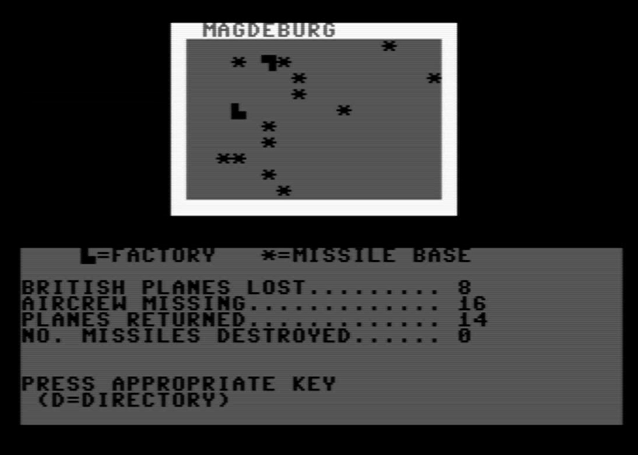
Attrition is huge, and my raid to Kiev does not return. It’s game over.
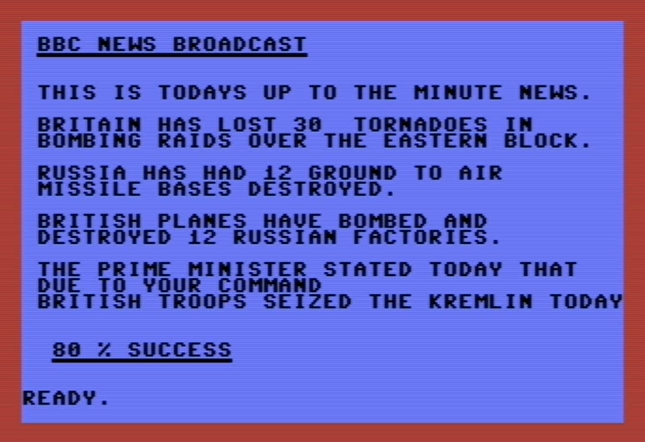
To my surprise, it’s still a victory despite not being able to take Kiev. Even more surprising, the British troops managed to take the Kremlin the same day, so either we paradropped super-soldiers right into the Kremlin or we have the fastest tanks known to man.
This is one of the most pointless games I’ve played – the enemy is passive so the only “choice” is whether to regroup your planes and, when you attack, whether you want to attack the missiles or the factories; there is probably a combination that wins the game 100% of the time. With 80% success in my first attempt I reckon you don’t even need to optimize that much.
Cascade Games is a British company that sold “50 games in one cassette” in late 1984/early 1985, with Rocket Launch one of the two games singled-out for a longer description in the ads, so you can imagine the quality of the rest of the package. Indeed, a comment on Lemon64 rates Rocket Launch 1-star, but still claims it is “one of the better Cassette 50 games“. Happily enough, none of the other games fall into my territory.
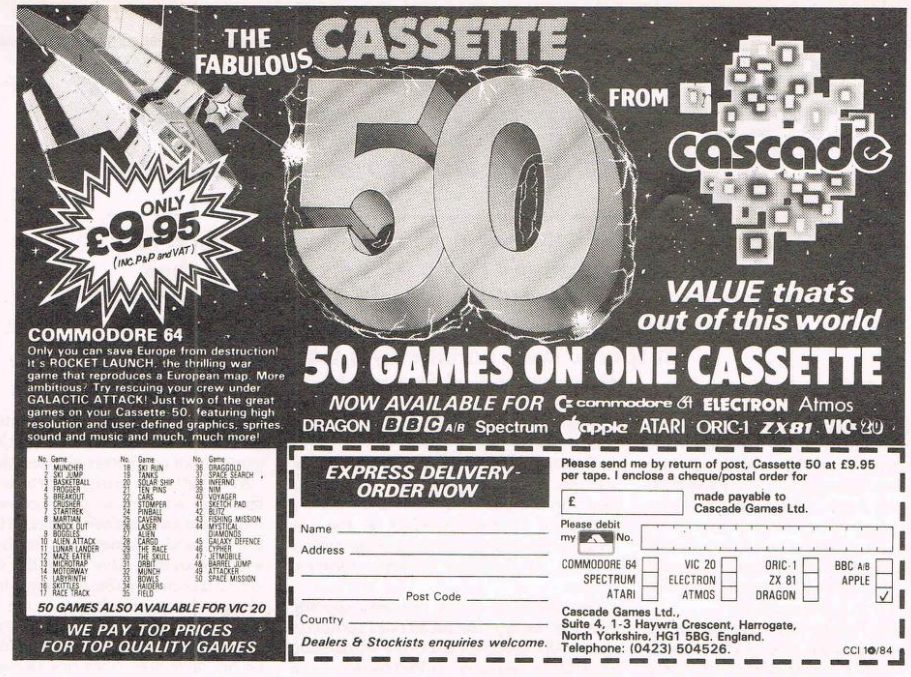
My Uruguayan computing article has been delayed; it started as a short BRIEF-sized article to complement my Argentinian article, and one thing leading to another now I am now waiting for a book I ordered directly from Uruguay. It’s still coming soon, but there may be another game before it.
5 Comments
Marvellous coverage as always. Thermo Nuclear War is written in BASIC, but cleverly obfuscated BASIC in that every number in the listing is zero. (I believe that the “real” numbers are still present though).
If you do well enough as NATO they are pleased, and you get made Major, or a General, or a Commander-in-Chief and get a cash prize too!
Priceless stuff. I remember the Thermo nuclear war review in Crash. It was rare for a game to get so scathing a review back then. Nice to see another review of it. Age has not been kind.
It looks like these are shovelware games before shovelware was a popular term.
I’d done the same over at CRPGAddicts, but it appears ‘Cascade Games Limited’ actually had a very long life, only being dissolved in 2018 in the UK:
https://find-and-update.company-information.service.gov.uk/company/01755554/filing-history
It would appear they went bust in 1990, but the liquidator appointed never completed the process (this is usually because they find out during the process that there isn’t enough cash to realise their own costs, so they just stop acting – in theory someone else should take over but this rarely happens – everyone just scatters to the winds).
I was puzzled by why “War Game” uses the English spelling “Moscow” for the Russian capital. I thought it was a sign that the game was actually the rip-off of an English or American production, but I could find nothing. Also, the misspelling “Kahrkov” also strongly hints the product is indeed Italian – in English this mistake would be much less likely. “Gorki” is also spelled differently in English.
My explanation for “Moscow” is that they wanted to use the Russian variants but they thought that the name of the city was the same in English and Russian. Italian publications have the bad habit of using English names instead of adopting the local variant or translating it in Italian.